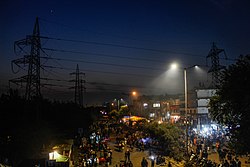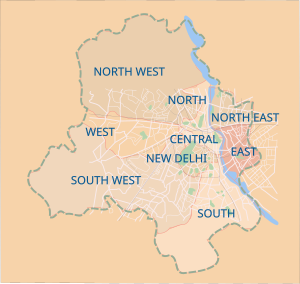Neighborhood of Delhi in South Delhi, India
| Shaheen Bagh | |
|---|---|
| Neighborhood of Delhi | |
 Shaheen Bagh at night Shaheen Bagh at night | |
 | |
| Coordinates: 28°33′05″N 77°17′49″E / 28.5513°N 77.2970°E / 28.5513; 77.2970 | |
| Country | India |
| State | Delhi |
| District | South Delhi |
| Languages | |
| • Official | |
| • Additional official | |
| Time zone | UTC+5:30 (IST) |
| PIN | 110025 |
| Vehicle registration | DL |
| Planning agency | Municipal Corporation of Delhi |

Shaheen Bagh is a neighbourhood in the South Delhi district of Delhi, India. It is on the U.P border and southernmost colony of the Okhla (Jamia Nagar) area, situated along the banks of the Yamuna. The locality is known for being the site of gathering for the protest against the Citizenship (Amendment) Act (CAA), National Register of Citizens (NRC) and National Population Register (NPR). Shaheen Bagh is recognized as one of the areas in Delhi with a significant Muslim population.
Etymology
Shaheen Bagh is named after the Shaheen falcon, with Shaheen itself being a Persian word. The name was chosen from a poem of Allama Iqbal's (Muhammad Iqbal) called Bal-e-Jibril (Gabriel's Wing). The area started to be populated in the early to mid 1980s.
History
Shaheen Bagh is the newest inhibitation in Jamia Nagar, which became populated after mid-1980s. Previously agricultural land, the Hindu Gujjar community developed plots for sale, drawing residents due to affordability compared to nearby Jamia Nagar. Many people earning petro-dollars in Arab countries bought property here. Early infrastructure was limited, lacking proper roads, sewage systems, and electricity.
The 1992 Babri Masjid demolition triggered a population shift, with Muslims from mixed localities seeking refuge in Shaheen Bagh. This influx led to a denser, more diverse community. Residents include working-class individuals like construction workers and tradespeople, alongside professors from Jamia Millia Islamia and businessmen.
Neighborhood
Shaheen Bagh's population is diverse, with residents originating from various Indian states like Uttar Pradesh, Bihar, Rajasthan, Madhya Pradesh, and Haryana. The Muslim community within the area exhibits a variety of Islamic beliefs. The architectural landscape of Shaheen Bagh is characterized by midrise apartment buildings constructed on relatively narrow plots of land, ranging from 25 to 400 sq. meters.
Shaheen Bagh has a high concentration of private schools, which are built on small plots of 200-300 square yards. Being a predominantly Muslim neighborhood, it has numerous mosques and Islamic institutions scattered throughout the locality.
Market
The road linking Kalindi Kunj Road to Allama Shibli Nomani Road, known as 40 Feet Road or Chaalis Futa Road saw a rise in cafes and biryani stalls catering to protesters. Social media increased the area's reputation, attracting foodies seeking Mughlai cuisine alongside Arabic, Afghan, Turkish, and Italian fare. New Delhi's well-known Mughlai food eateries, including Javed Famous Nihari, Zehra Biryani, Aslam Butter Chicken, Karim's and Qureshi Kabab, have opened here in the last three years, influencing Shaheen Bagh's position as a major culinary hub.
In addition to its known culinary offerings, Shaheen Bagh is also a hub for factory outlets of various clothing brands. These brands include Allen Solly, Woodland, Van Heusen, Flying Machine, Arrow, Bata, Skechers, Biba, and Adidas, among many others. These outlets can be found in the lane adjoining the main road, GD Birla Marg.
Connectivity
This area has connectivity to nearby commercial and official areas such as Noida, Nehru Place, Sarita Vihar, Jasola, Okhla Industrial Area, Kalindi Kunj and Okhla Railway Station. It also has connectivity to universities like Jamia Millia Islamia, Jamia Hamdard, and Amity University. A metro train railway station named as Jasola Vihar Shaheen Bagh metro station connects Shaheen Bagh to the Delhi metro network. A metro train station is present in Sarita Vihar, around 1–2 km from Shaheen Bagh. Buses for major routes start from nearby Kalindi Kunj.
Protest Site
Main article: Shaheen Bagh protestThis place is widely known for the Shaheen Bagh protests held during the nation-wide movement against the CAA, NRC and NPR. The protests were mainly led by Muslim women of Shaheen Bagh in a form sit-in for more than 4 months. They blocked the highway connecting Noida inspired by the call of Sharjeel Imam for 'Chakka Jam' (traffic block).
References
- ^ "Official Language Act 2000" (PDF). Government of Delhi. 2 July 2003. Archived from the original (PDF) on 4 March 2016. Retrieved 29 January 2020.
- Lakhwani, Nikhil (8 February 2020). "After polarising campaign, Shaheen Bagh goes to vote amid heavy security". India Today. Retrieved 8 February 2020.
- Mathew, Ashlin (14 March 2020). "Protests to continue until CAA-NPR-NRC withdrawn, say Shaheen Bagh protestors, activists". National Herald. Retrieved 15 February 2021.
- ^ Iftikhar, Fareeha (23 January 2020). "Shaheen Bagh living up to its name, says man who christened the colony". Hindustan Times. Retrieved 24 January 2020.
- ^ "To better understand the Shaheen Bagh protest, we must understand the locality itself". caravanmagazine.in. Retrieved 23 June 2024.
- ^ "The iftar hotspot in New Delhi – launched by a citizenship law protest". Al Jazeera. Retrieved 3 April 2024.
- "Shaheen Bagh, the new food hub in south Delhi". The Patriot. 18 March 2024. Retrieved 7 July 2024.
- "From Protest Site To Foodies Heaven, Delhi's Shaheen Bagh Has 'Moved On'". Times Now. 5 April 2024. Retrieved 7 July 2024.
- "Shaheen Bagh leaves past behind, emerges as shopping hub". www.awazthevoice.in. Retrieved 3 April 2024.
- Farooqi, Farah (20 January 2020). "To better understand the Shaheen Bagh protest, we must understand the locality itself". The Caravan. Retrieved 26 January 2020.
- Faisal, Syed Mohammed (2020). "Shaheen Bagh and the hermeneutics of Muslim identity in South Asia". HAU: Journal of Ethnographic Theory. 10 (3): 767–775. doi:10.1086/712221. S2CID 229291218.
This article related to a location in the Indian state of Delhi is a stub. You can help Misplaced Pages by expanding it. |